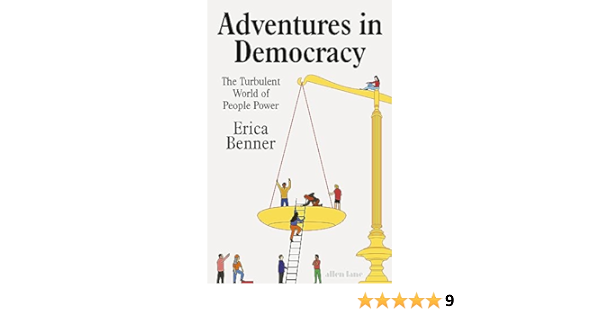Democracy in today’s world: can it survive?
Adventures in Democracy: The Turbulent World of People Power
by Erica Benner (Allan Lane, £25.00 / €29.50)
This short book by political philosopher Erica Benner is a timely meditation on the nature of democracy, both ancient and modern.
It is timely because democratic values are under threat everywhere today, including in the United States which Benner regards correctly as the birthplace of modern democracy.
Dr Benner, by the way, currently teaches at the Hertie School for Governance in Berlin, is President of the European Society for the History of Political Thought, and a founding editor of the Brill series History of European Political and Constitutional Thought.
Beginnings
The opening sentence of her book notes that “modern democracy will celebrate its 250th anniversary in 2026”. The first shots of the American Revolution fired at Lexington and Concord were indeed “heard around the world”.
The clearest and most succinct definition of democracy is Lincoln’s formulation in his Gettysburg address: “government of the people, by the people, for the people”.
This is the gold standard, and most democracies fall short of the ideal even in the best of circumstances. Benner writes that “wherever democracies have sprung up over the past 2,500 years [since democratic Athens], the people who live in them have been notorious for misbehaving”.
Inequalities make people distrust democratic ideals and the elites, local or foreign, who promote them”
Perhaps the most blatant example of such misbehaviour in modern times has been the United States, where – in Benner’s words – “democracy was born trying to get away with the ultimate contradiction: claiming to be the beacon of universal equality while allowing a roaring slave trade”.
This contradiction persisted with so-called ‘Jim Crow’ segregation laws for another 100 years after the fighting in the Civil War ended.
Benner’s central thesis is that democracy cannot long survive “where people are vastly unequal in status, wealth and material security”. She argues that “inequalities make people distrust democratic ideals and the elites, local or foreign, who promote them”.
She notes that “glaring inequalities are the reality in most democracies today [and] they are growing at an alarming speed”; hence the threat to democratic values everywhere.
Intentions
The dynamic here, as Benner explains, is that we all desire “to be safer, richer, cleverer, more respected, more powerful than others – first among equals, maybe way-ahead first” and most modern democracies are “hypercompetitive societies whose ruling ideologies praise economic super-achievers and shame the less successful”.
These instincts need to be curtailed in the interests of preserving a healthy democracy: it is necessary “to regulate extremes of wealth and poverty”.
This requires constant vigilance since, to quote Benner: “sometimes it takes a very long time to recognise … that economic inequalities have been driving deep political and cognitive wedges between different sets of citizens”.
Personal freedom is ‘not an open invitation to chase your dreams unchecked’”
Benner’s analysis prompts questions about the trade-off between freedom and equality.
She addresses that issue in a chapter which traces her own progress from being a disciple of Ayn Rand and sharing Rand’s belief in the “virtue of selfishness” – in other words, always follow your self-interests – to a realisation that one’s personal freedom, if it is to be sustained within a democratic society, “needs support from a wider, well-organised scheme of shared freedom”.
She concludes that personal freedom is “not an open invitation to chase your dreams unchecked. It’s a give-and-take scheme that protects my personal freedom within limits that leave space, opportunities and decent options for everyone else”.
Equality
She thus reiterates the importance of equality in a democratic society: “It follows that democratic freedom needs a commitment to some kind of equality. Not the kinds that strike dread in some freedom lovers’ hearts: fixed economic levelling, indoctrination in ‘woke’ egalitarianism, etc. Just equal respect for all, equal consideration of their concerns, equal voice, equal freedom.”
This book is an important wake-up call for all of us who are concerned about the future – even the survival – of democratic values in the modern world.
It is based on a deep understanding of the history and philosophy of democracy, but Benner carries her learning lightly and most readers will find her book both accessible and enlightening.



